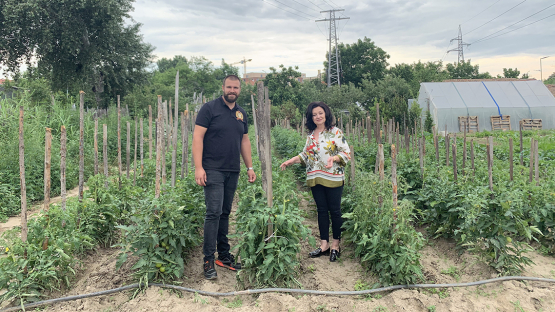Bulgaria, one of the most biodiverse countries in Europe, has long been a major exporter of various food products. With gradually warming temperatures over the past decades, farmers have seen the yield and quality of key crops fall. To adapt to the changing environment and continue to provide healthy and sustainable vegetables, nuclear techniques are being used.
“We are known for high quality crops in Bulgaria, based on longstanding traditions in vegetable production throughout the country,” said Nasya Tomlekova, Head of the Molecular Biology Laboratory at the Maritsa Vegetable Crops Research Institute (MVCRI) located in Bulgaria’s second largest city, Plovdiv. “We now have more complex issues related to low production and quality of the local varieties. We need to develop within this area and promote these products – using nuclear techniques, this is possible.”
Current plant breeding programmes, supported by the IAEA in partnership with the Food and Agriculture Organization of the United Nations (FAO), are focusing on developing new pepper, tomato and potato varieties.
Over the next three years, three pepper varieties will be made available to farmers. One of them, Zlatna shipka, released earlier this year, has a 7% higher yield than the traditional variety. In 2021, a Desislava pepper variety with higher yields and increased beta-carotene concentrations, the same amount found in a carrot, will be released. This is important, because high beta-carotene intake, which our body converts into Vitamin A, is crucial for healthy skin and eyes and a strong immune system. A Toniko pepper variety to be released in 2022 will also have increased beta-carotene concentrations.
“Like every farmer, I have invested a lot of care and work into providing a healthy and rich quality harvest,” said Yancho Valchev, one of the farmers involved in the pilot trials of the plant breeding programme. “We face many difficulties – climate change, vegetable diseases, insects and pests – but through these programmes we have been able to record higher yields and better quality in our crops.”
“As a young person in my late 20s I am interested in healthy food and healthy living, and as a farmer I am able to provide this through the new varieties,” said Iliya Valchanov, another farmer involved in the programme. “Right now, such products are preferred in the local markets, especially by young people, who share an interest in healthy eating.”
This is only the latest effort by the IAEA and FAO to support Bulgaria’s agriculture. Over the past 50 years, 76 crop varieties have been developed by Bulgarian specialists following their participation in IAEA trainings and research in the use of nuclear techniques for sustainable food production and food security (see What is mutation breeding?).
“The fruitful collaboration between the IAEA, FAO and MVCRI will continue in the development of improved varieties of pepper, tomato and potato with high yields, improved nutritional quality and the ability to adapt to climate change, enhancing food security throughout the country,” said Fatma Sarsu, plant breeder and geneticist at the Joint FAO/IAEA Division of Nuclear Techniques in Food and Agriculture.





